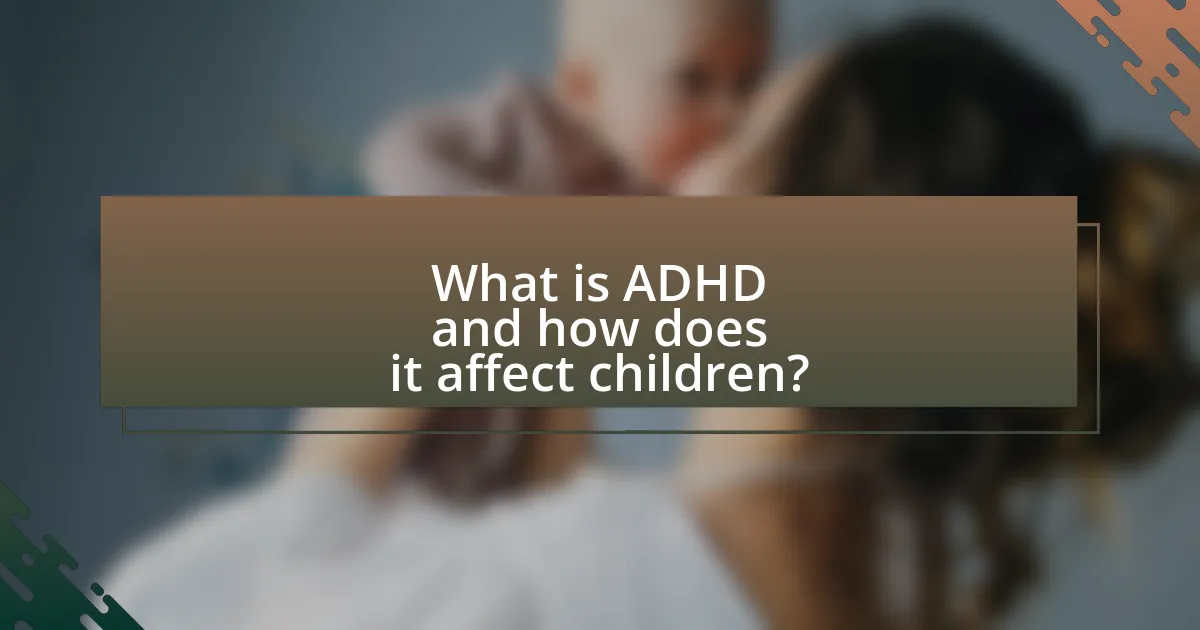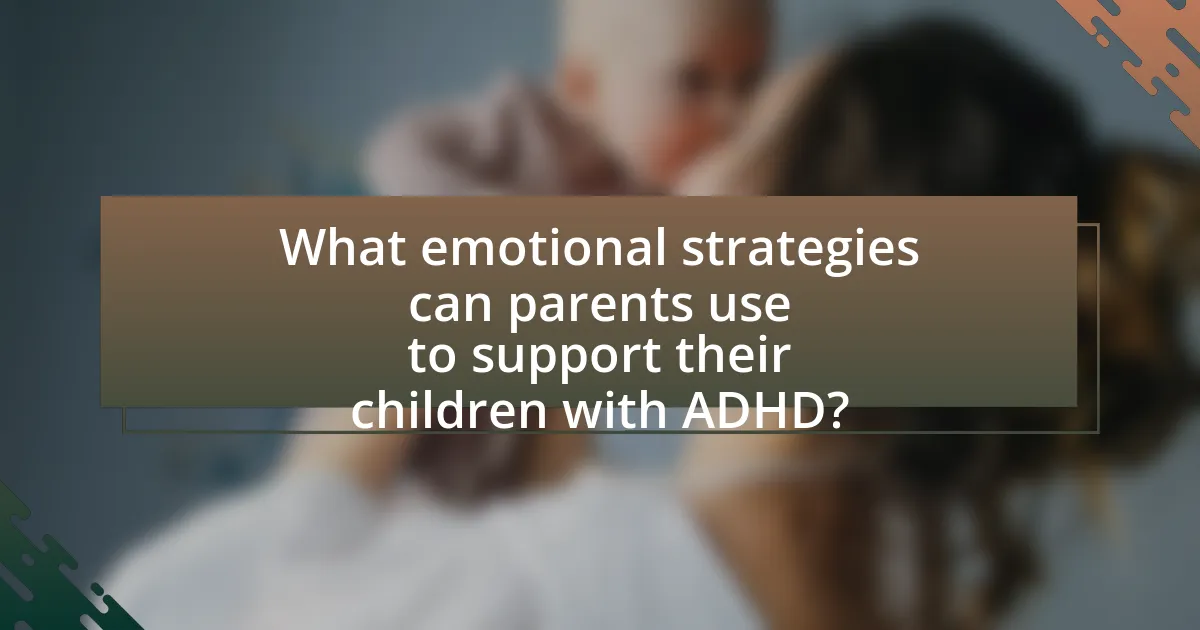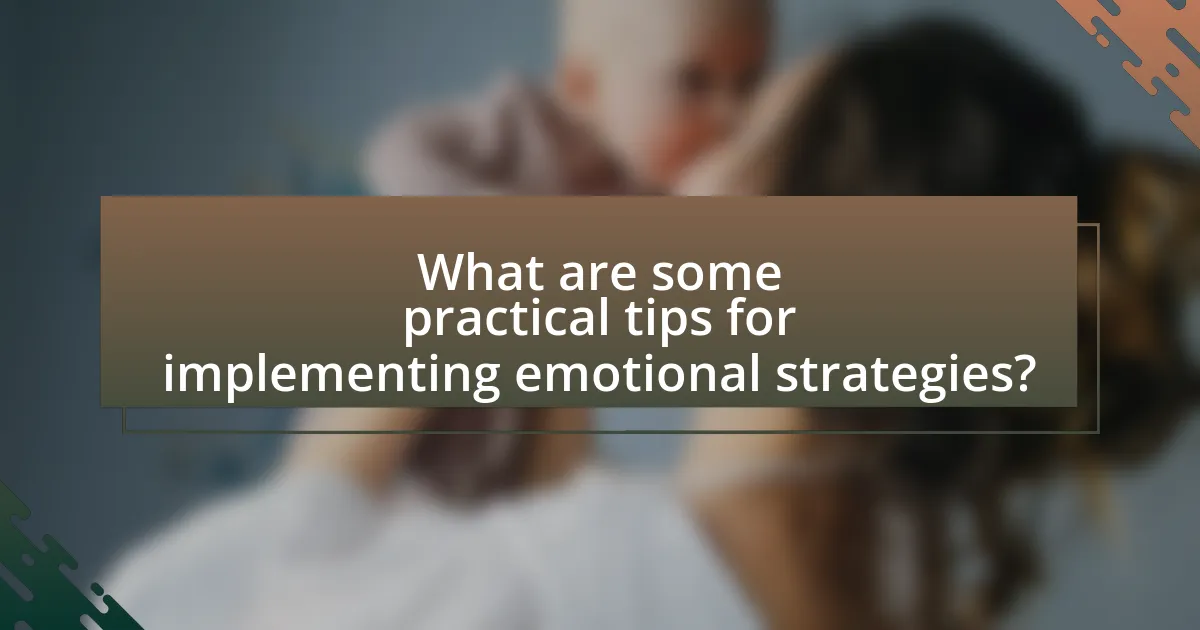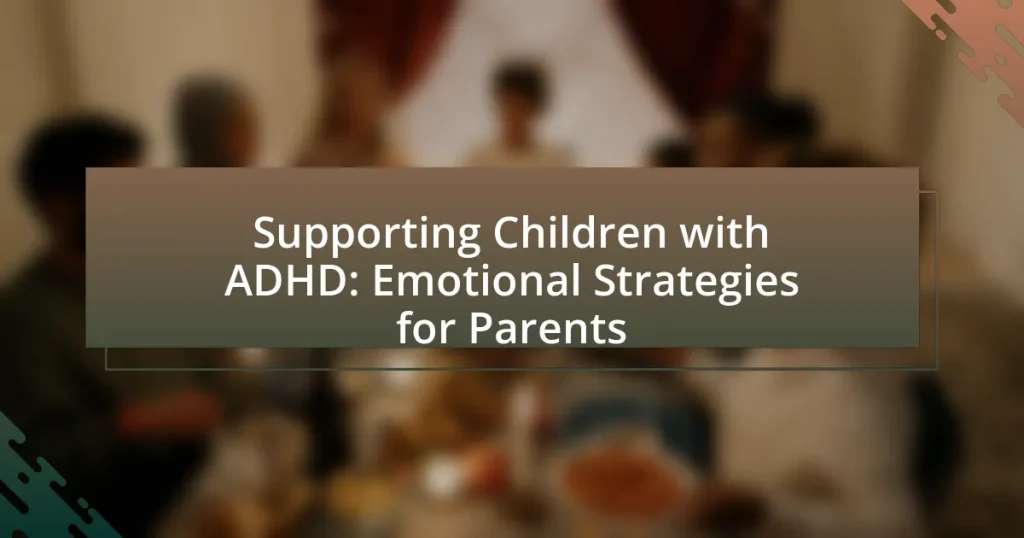The article focuses on supporting children with Attention-Deficit/Hyperactivity Disorder (ADHD) through effective emotional strategies for parents. It outlines the characteristics and symptoms of ADHD, including inattention, hyperactivity, and impulsivity, and discusses the emotional challenges these children face, such as anxiety and low self-esteem. The article emphasizes the importance of emotional support from parents, detailing strategies like active listening, positive reinforcement, and creating a structured home environment. Additionally, it highlights the role of routines, communication techniques, and available resources for parents seeking guidance, ultimately aiming to foster resilience and improve the overall well-being of children with ADHD.

What is ADHD and how does it affect children?
ADHD, or Attention-Deficit/Hyperactivity Disorder, is a neurodevelopmental disorder characterized by persistent patterns of inattention, hyperactivity, and impulsivity that interfere with functioning or development in children. Children with ADHD may struggle to focus on tasks, follow instructions, and manage their impulses, which can lead to academic challenges, difficulties in social interactions, and issues with self-regulation. Research indicates that ADHD affects approximately 5-10% of children globally, highlighting its prevalence and impact on daily life.
What are the common symptoms of ADHD in children?
Common symptoms of ADHD in children include inattention, hyperactivity, and impulsivity. Inattention manifests as difficulty sustaining attention, following through on tasks, and organizing activities. Hyperactivity is characterized by excessive movement, fidgeting, and an inability to stay seated. Impulsivity involves acting without thinking, interrupting others, and difficulty waiting for one’s turn. According to the American Psychiatric Association, these symptoms can significantly impair a child’s functioning in academic, social, and home settings.
How do these symptoms manifest in daily life?
Symptoms of ADHD manifest in daily life through difficulties in maintaining attention, impulsivity, and hyperactivity. Children may struggle to focus on tasks, leading to incomplete homework or difficulty following instructions. Impulsivity can result in interrupting conversations or acting without considering consequences, which affects social interactions. Hyperactivity often presents as excessive movement or fidgeting, making it challenging for children to sit still in classroom settings. These behaviors can lead to academic challenges, strained relationships with peers and adults, and increased frustration for both the child and their parents.
What emotional challenges do children with ADHD face?
Children with ADHD face significant emotional challenges, including heightened levels of anxiety, frustration, and low self-esteem. These emotional difficulties stem from their struggles with attention regulation, impulsivity, and hyperactivity, which can lead to negative feedback from peers and adults. Research indicates that children with ADHD are more likely to experience mood disorders, with studies showing that approximately 30% to 50% of children with ADHD also have co-occurring anxiety disorders. This combination can exacerbate feelings of isolation and inadequacy, making it essential for parents to implement supportive emotional strategies.
Why is emotional support important for children with ADHD?
Emotional support is crucial for children with ADHD because it helps them manage their symptoms and enhances their overall well-being. Children with ADHD often experience heightened emotional dysregulation, leading to difficulties in social interactions and academic performance. Providing emotional support fosters a sense of security and acceptance, which can mitigate feelings of frustration and isolation commonly associated with ADHD. Research indicates that children who receive consistent emotional support from caregivers exhibit improved self-esteem and resilience, which are essential for coping with the challenges of ADHD.
How does emotional support impact a child’s development?
Emotional support significantly enhances a child’s development by fostering secure attachments and promoting emotional regulation. Children who receive consistent emotional support are more likely to develop resilience, social skills, and a positive self-image. Research indicates that secure attachments formed through emotional support lead to better cognitive and emotional outcomes, as evidenced by a study published in the journal “Child Development,” which found that children with strong emotional support systems exhibit improved academic performance and social competence.
What role do parents play in providing emotional support?
Parents play a crucial role in providing emotional support by fostering a secure environment that promotes their child’s emotional well-being. This support includes actively listening to their child’s feelings, validating their emotions, and offering reassurance during challenging times. Research indicates that children with ADHD benefit significantly from parental emotional support, as it enhances their self-esteem and coping mechanisms. A study published in the Journal of Attention Disorders found that children with ADHD who received consistent emotional support from their parents exhibited lower levels of anxiety and improved social skills. Thus, the active involvement of parents in emotional support is essential for the healthy development of children, particularly those facing the challenges associated with ADHD.

What emotional strategies can parents use to support their children with ADHD?
Parents can support their children with ADHD by employing emotional strategies such as active listening, positive reinforcement, and teaching emotional regulation skills. Active listening involves giving full attention to the child’s feelings and concerns, which fosters a sense of validation and understanding. Positive reinforcement encourages desired behaviors by acknowledging and rewarding achievements, no matter how small, which can boost the child’s self-esteem and motivation. Teaching emotional regulation skills helps children identify and manage their emotions effectively, leading to improved coping mechanisms in challenging situations. Research indicates that these strategies can significantly enhance emotional well-being and behavioral outcomes for children with ADHD, as supported by studies highlighting the importance of emotional support in managing ADHD symptoms.
How can parents create a supportive home environment?
Parents can create a supportive home environment by establishing consistent routines, fostering open communication, and providing emotional support. Consistent routines help children with ADHD feel secure and understand expectations, which can reduce anxiety and improve behavior. Open communication allows children to express their feelings and challenges, promoting a sense of belonging and understanding. Emotional support, including positive reinforcement and empathy, helps children build self-esteem and resilience. Research indicates that structured environments and supportive relationships significantly enhance the well-being of children with ADHD, leading to better emotional and behavioral outcomes.
What specific practices can foster emotional well-being?
Practices that can foster emotional well-being include mindfulness meditation, regular physical activity, and maintaining strong social connections. Mindfulness meditation has been shown to reduce stress and improve emotional regulation, as evidenced by a study published in the journal “Psychological Science,” which found that participants who practiced mindfulness reported lower levels of anxiety and improved mood. Regular physical activity, such as aerobic exercise, is linked to the release of endorphins, which enhance mood and reduce feelings of depression, supported by research from the American Psychological Association indicating that exercise can significantly improve mental health. Additionally, maintaining strong social connections provides emotional support and reduces feelings of isolation, which is crucial for emotional well-being, as highlighted in studies from the Journal of Health and Social Behavior that demonstrate the positive impact of social relationships on mental health outcomes.
How can routines help children with ADHD feel secure?
Routines help children with ADHD feel secure by providing a structured environment that reduces uncertainty and anxiety. Consistent daily schedules allow children to anticipate what will happen next, which can alleviate feelings of chaos and unpredictability often associated with ADHD. Research indicates that children with ADHD benefit from predictable routines, as these can enhance their ability to focus and manage their emotions effectively. For instance, a study published in the Journal of Attention Disorders found that structured routines significantly improved behavioral outcomes in children with ADHD, demonstrating that stability in daily activities fosters a sense of security and well-being.
What communication techniques are effective for parents?
Effective communication techniques for parents include active listening, clear and concise messaging, and positive reinforcement. Active listening involves fully engaging with the child, demonstrating understanding and empathy, which fosters trust and openness. Clear and concise messaging helps children with ADHD process information better, reducing confusion and frustration. Positive reinforcement encourages desired behaviors by acknowledging and rewarding them, which can significantly improve a child’s self-esteem and motivation. Research indicates that these techniques enhance parent-child relationships and support emotional regulation in children with ADHD, leading to better behavioral outcomes.
How can parents encourage open dialogue about feelings?
Parents can encourage open dialogue about feelings by creating a safe and non-judgmental environment for their children. This involves actively listening to their children’s emotions, validating their feelings, and using open-ended questions to facilitate discussion. Research indicates that children with ADHD often struggle with emotional regulation, making it crucial for parents to model emotional expression and provide consistent opportunities for conversation. For instance, a study published in the Journal of Attention Disorders highlights that children who feel understood by their parents are more likely to express their feelings openly, leading to better emotional outcomes.
What language should parents use to validate their child’s emotions?
Parents should use empathetic and affirming language to validate their child’s emotions. This includes phrases like “I understand that you’re feeling upset” or “It’s okay to feel frustrated.” Such language acknowledges the child’s feelings without judgment, fostering an environment where the child feels heard and understood. Research indicates that validating a child’s emotions can enhance their emotional regulation and self-esteem, particularly in children with ADHD, who may struggle with emotional dysregulation. By using supportive language, parents can help their children develop healthier coping mechanisms and improve their emotional resilience.

What are some practical tips for implementing emotional strategies?
Practical tips for implementing emotional strategies include establishing a consistent routine, using positive reinforcement, and practicing active listening. Establishing a consistent routine helps children with ADHD feel secure and understand expectations, which can reduce anxiety and emotional outbursts. Positive reinforcement encourages desired behaviors by rewarding children when they manage their emotions effectively, thereby reinforcing those behaviors over time. Active listening involves fully engaging with the child’s feelings and concerns, which fosters trust and helps them articulate their emotions better. Research indicates that these strategies can significantly improve emotional regulation in children with ADHD, leading to better overall outcomes in their behavior and emotional health.
How can parents manage their own emotions while supporting their child?
Parents can manage their own emotions while supporting their child by practicing self-regulation techniques such as mindfulness, deep breathing, and seeking social support. Mindfulness helps parents stay present and reduces anxiety, allowing them to respond calmly to their child’s needs. Deep breathing exercises can lower stress levels, enabling parents to approach challenging situations with a clearer mindset. Additionally, connecting with other parents or professionals provides emotional support and practical strategies, reinforcing the idea that they are not alone in their experiences. Research indicates that parents who engage in self-care and emotional regulation are better equipped to support their children effectively, leading to improved outcomes for both parties.
What self-care practices can help parents stay balanced?
Self-care practices that can help parents stay balanced include regular physical exercise, mindfulness meditation, and establishing a consistent sleep routine. Engaging in physical exercise, such as walking or yoga, has been shown to reduce stress and improve mood, which is crucial for parents managing the challenges of raising children with ADHD. Mindfulness meditation can enhance emotional regulation and decrease anxiety, allowing parents to respond more calmly to their children’s needs. Additionally, maintaining a consistent sleep routine is vital, as research indicates that adequate sleep significantly impacts emotional well-being and cognitive function, enabling parents to better support their children.
How can parents model emotional regulation for their children?
Parents can model emotional regulation for their children by demonstrating healthy coping strategies during stressful situations. For instance, when faced with frustration, parents can verbalize their feelings and articulate how they plan to manage those emotions, such as taking deep breaths or stepping away to cool down. Research indicates that children learn emotional regulation through observation; when they see their parents effectively managing emotions, they are more likely to adopt similar strategies themselves. A study published in the Journal of Child Psychology and Psychiatry found that parental emotional expression significantly influences children’s emotional development, highlighting the importance of modeling appropriate responses to emotions.
What resources are available for parents seeking additional support?
Parents seeking additional support for children with ADHD can access various resources, including specialized organizations, online forums, and educational materials. Organizations such as CHADD (Children and Adults with Attention-Deficit/Hyperactivity Disorder) provide information, support groups, and advocacy resources tailored for ADHD. Online platforms like ADDitude offer articles, webinars, and community forums where parents can share experiences and strategies. Additionally, local mental health professionals and school counselors can provide personalized guidance and support. These resources are validated by their widespread use and recognition in the ADHD community, ensuring parents have access to reliable information and support networks.
How can support groups benefit parents of children with ADHD?
Support groups can significantly benefit parents of children with ADHD by providing emotional support, practical advice, and a sense of community. These groups allow parents to share experiences and strategies, which can lead to improved coping mechanisms and reduced feelings of isolation. Research indicates that parents who participate in support groups report lower stress levels and increased confidence in managing their child’s behavior. For instance, a study published in the Journal of Attention Disorders found that parental involvement in support groups correlates with enhanced parenting skills and better outcomes for children with ADHD.
What professional services should parents consider for emotional guidance?
Parents should consider engaging with mental health professionals such as child psychologists, counselors, and therapists for emotional guidance. These professionals specialize in addressing emotional and behavioral challenges, particularly in children with ADHD, and can provide tailored strategies to support emotional regulation and coping skills. Research indicates that therapy can significantly improve emotional outcomes for children with ADHD, as evidenced by studies showing enhanced emotional well-being and reduced behavioral issues following therapeutic interventions.
What are the best practices for fostering resilience in children with ADHD?
The best practices for fostering resilience in children with ADHD include creating a structured environment, promoting self-advocacy, and encouraging positive relationships. A structured environment helps children understand expectations and routines, which can reduce anxiety and improve focus. Promoting self-advocacy empowers children to express their needs and seek help, enhancing their confidence and problem-solving skills. Encouraging positive relationships with peers and adults provides emotional support and reinforces social skills, which are crucial for resilience. Research indicates that children with ADHD who have strong support systems and clear structures are more likely to develop coping strategies and adapt to challenges effectively.
